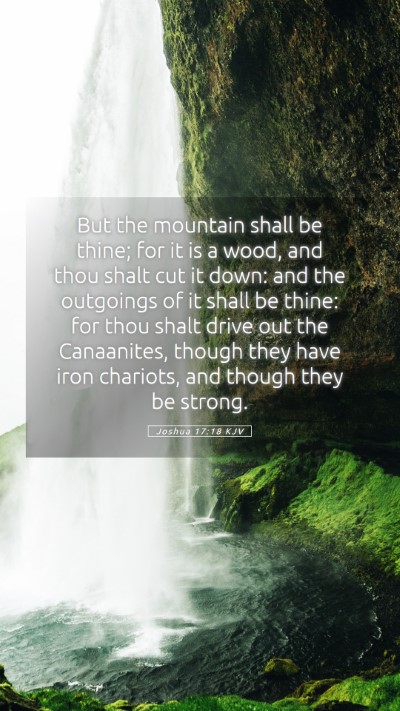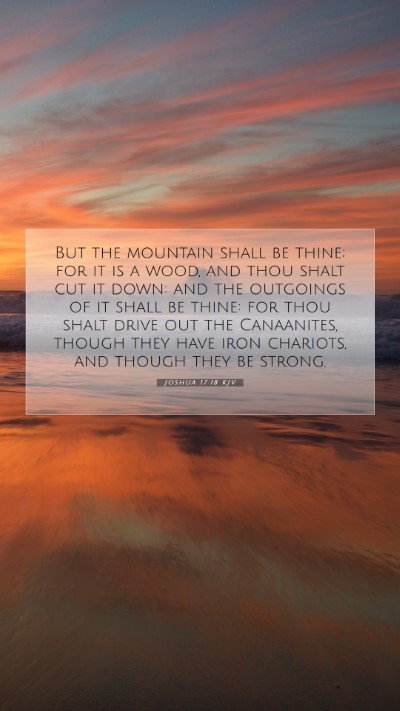Old Testament
Genesis Exodus Leviticus Numbers Deuteronomy Joshua Judges Ruth 1 Samuel 2 Samuel 1 Kings 2 Kings 1 Chronicles 2 Chronicles Ezra Nehemiah Esther Job Psalms Proverbs Ecclesiastes Song of Solomon Isaiah Jeremiah Lamentations Ezekiel Daniel Hosea Joel Amos Obadiah Jonah Micah Nahum Habakkuk Zephaniah Haggai Zechariah MalachiJoshua 17:18 Meaning
What is the meaning of Joshua 17:18?
But the mountain shall be thine; for it is a wood, and thou shalt cut it down: and the outgoings of it shall be thine: for thou shalt drive out the Canaanites, though they have iron chariots, and though they be strong.
Joshua 17:18 Bible Verse Meaning
Bible Verse Commentary: Joshua 17:18
Verse: "But the mountain shall be yours; for it is a wood, and you shall cut it down, and the outgoings of it shall be yours: for you shall drive out the Canaanites, though they have iron chariots, and though they be strong."
Understanding Scripture:
Overview of the Verse
This verse conveys God's promise to the tribe of Manasseh, emphasizing the importance of faith in overcoming challenges. It showcases divine assurance that, despite the presence of formidable enemies, victory is attainable through reliance on God's power.
Bible Verse Meanings
According to Matthew Henry, the mention of the mountain symbolizes both spiritual elevation and the struggles that accompany the pursuit of God's promises. Albert Barnes emphasizes that God's presence is key in acquiring territory that seems unattainable, while Adam Clarke highlights the significance of the land as a gift from God which requires active engagement by the people to possess it fully.
Key Elements of the Verse
- The Mountain: Represents spiritual fortitude and the challenges believers face.
- Canaanites: Symbolize obstacles and adversaries that test faith.
- Iron Chariots: Illustrate the strength of foes but also the need for reliance on divine strength rather than mere human power.
Biblical Exegesis
In examining this verse within its context, it’s evident that God is encouraging the Israelites, particularly the tribe of Manasseh, to confront their fears and possess their inheritance. The directive to "drive out the Canaanites" signifies a call to action, implying that spiritual and physical battles necessitate human participation alongside divine intervention.
Historical Context
During the time of Joshua, the Israelites were establishing their identity and securing their land in Canaan. The conquest was fraught with dangers, and this promise served as a motivational assurance amidst uncertainties.
Application of the Verse
For modern readers, this verse serves as a profound reminder of faith's role in overcoming life's obstacles. The metaphor of wood that can be cut down implies that challenges are surmountable. Just as the Israelites were instructed to drive out their foes, believers today are encouraged to confront their difficulties with courage and faith.
Practical Lessons
- Tackle life's challenges with reliance on God.
- Engage actively in spiritual battles, trusting God for strength.
- Understand that God's promises may require effort and perseverance to realize fully.
Connecting with Other Scriptures
This verse echoes themes found throughout the Bible. Here are a few related passages:
- Numbers 33:52-53 - God's command to dispossess the inhabitants of the land.
- Joshua 1:9 - The call to be strong and courageous, knowing God is with us.
- Romans 8:37 - Assurance that we are more than conquerors through Him who loves us.
Conclusion: Insights for Bible Study
In summary, Joshua 17:18 offers profound Bible study insights for anyone seeking to deepen their Bible verse understanding. It encourages active participation in faith, fortifies the believer's resolve to confront difficulties, and reassures that with God, all things are possible. The rich tapestry of commentary from noted scholars invites readers to explore the significance of this Bible passage in both its historical context and its application in modern life.


